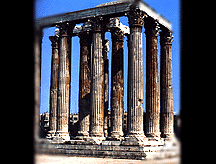
|

|
This seminar will deal with the Greek polis, or city-state, often defined as a town together with its territory, including secondary settlements. The type is exemplified by Athens, the best-documented and arguably most important polis in antiquity. We will use Athens as our model but will consider other city-states, e.g., Sparta, Thebes, or Syracuse in Sicily, and also another type of Greek community organized around different principles, the so-called "ethnos." The course will draw on a variety of sources, but the emphasis will be on the material culture of everyday life from the 6th to 4th centuries BCE. Questions we will consider: What was life like in a city such as Athens at different times, for different individuals? How did poor people worship, eat, make their livings, entertain themselves? What did they do when they were ill? What were the uses and meanings of art, writing, music in different communities? By contrast, what was life like in the countryside, or in those communities without the political structures that mark the polis? In effect, was there a "Greek way of life"?
COURSE FORMAT: Discussion
Level: UGRD Credit: 1 Gen Ed Area Dept: NONE Grading Mode: Graded
Prerequisites: NONE Links to Web Resources For This Course.
Last Updated on MAR-30-2006
Copyright Wesleyan University, Middletown, Connecticut, 06459